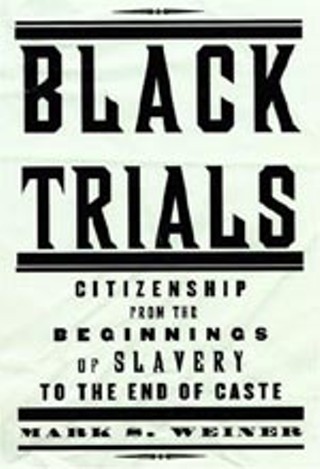Black Trials: Citizenship From the Beginnings of Slavery to the End of Caste
Reviewed by Roger Gathman, Fri., Oct. 8, 2004

Black Trials: Citizenship From the Beginnings of Slavery to the End of Caste
by Mark S. WeinerKnopf, 448 pp., $26.95
There is a self-flattering myth afloat in the American culture that racism is a matter of feeling and taste, much like disliking squash, or being hateful on your birthday. Well, no. Racism is only secondarily a matter of feeling, and is primarily a matter of institution and custom. Slavery, and after it, Jim Crow, was firstly a thing of profit, secondly a preservative of a certain order, and finally, the impress of these advantages sinking by degrees into the soul of what D.H. Lawrence called the American Paleface, where it became the second nature, often denied, that we wake up to every day.
Weiner's book is about two processes – one is the process of making white supremacy, and one is the process of undoing it. Both of them happened in the bread and circuses venue of the courtroom (among other places). Weiner's method is to find the narrative nuggets in obscure and famous cases and use them to show how race relations have been ritualized in this culture. Among the interesting obscure cases are the trials of such figures as Caesar, aka John Gwin, a slave who was hung for conspiracy to revolt in 1741 in NYC, and Charles Green, who sued a theatre (which was, ironically, featuring a black choral group) in San Francisco in 1876, under the provisions of the post-Civil War Civil Rights Act, for discrimination in not seating him because he was black (a case that, through various legal shifts, he lost). Among the better known are those of Brown v. the Board of Education, the murder trials of Mumia Abu-Jamal and Huey P. Newton, and the confirmation hearing of Clarence Thomas. Oddly, no O.J., which misses out on the biggest white panic of recent times.
This book should disabuse those who assume that the justice system is about expanding civil rights and liberties. The court system has absolutely no institutional bias toward expanding or preserving civil rights. The court's civil rights heroism depends entirely on the courage and stubbornness with which its established biases are defied, until that defiance becomes itself an established bias. As both MLK and Malcolm X knew, liberation happens in buses and on street corners first, and it is never given – but always taken.










